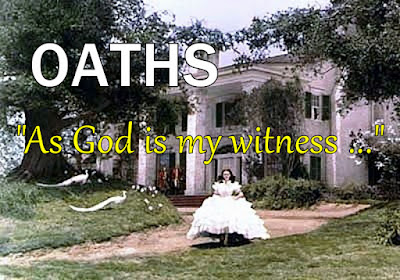RECKLESS FAITH - GREAT EXPECTATIONS
Luke 15:25-32
Micah 6:6-8
"You know, Dad, I just don't understand you," said the elder son. His words were sharp with a bitter edge.
"Your son runs off and squanders your money on booze and cheap whores. Then he has the gall to drag his sorry butt back home after months of not even a postcard to let you know he's still alive, and you forgive him?!? He comes home after dishonoring our family name, stinking of pigs, and with nothing to show for himself.
And what do I find when I come home a hard day out in the fields? The house is full of people and you're throwing a welcome home party for that little .... that little ... when did you ever throw a party for me and my friends?!?
Where's my fatted calf? I deserve some appreciation for all the years I've worked 24/7 on this farm. I could have done the same thing, but no, I stayed here. I have never given you a reason to worry about me, and I've never shamed this family like he has. I've been an obedient and good son. Where's my reward!"
The elder brother was certainly full of self: self-righteous and judgmental; self-centered and jealous, self-pity and resentful, and selfish. His reaction is a polar opposite to his younger brother's humility and contriteness.
Sometimes, the prodigal son is actually the one who stays at home. Sometimes the model child is in as much need of restoring grace as the rebellious sibling. I know, because I've struggled with being the elder daughter.
We have prodigal child in our family who hasn't come home, yet. At this time, we have no idea exactly where she is and what she's doing. Over the years, I strove to be the good daughter while harboring feelings of anger and jealousy. I rarely missed the opportunity to lecture my parents on her failings or criticize what she did or said. I know now, that like the prodigal son, she is being punished by the consequences of her behavior.
There's a lot of us elder sibling out there. Sometimes we use the weakness and failures of others to feel superiour about ourselves at the expense of those most in need of our compassion and kindness.
But still, I wonder. If she came back into my life, what would I do? Would I continue to play the role of the elder sister or would I welcome her back with the open arms of the loving father.
Every parent who loves their children sets boundaries, makes rules and has expectations for their behavior. They do this so their children will feel good about themselves and live happy and full lives. Sometimes, children don't understand that. How many of us have heard those words, "Well, as long as you live under my roof, you're going to follow my rules."
How many of us as parents have said that very thing to a son or daughter who wanted to act in unwise and inappropriate ways because they wanted it to do their own way. Those are the times when we tryu to guide them to a different, better pathway.
For generations, the Pharisees and Scribes had been playing the role of the elder brother in Jewish society. Their idea of faithfulness was going through the motions of being God's perfect children by offering extravagant sacrifices and adhering strictly to the Law. In reality, they lacked a deep, personal relationship with their Heavenly Father and a compassionate heart for their brothers and sisters. They were pretty full of self.
God sent a message to them through the prophet Micah. "Children, what pleases me is a different way, a better way to be in relationship with me and with other people. Forget all about the sacrifices and the empty motions of worship. Instead, this is what I require of you:
Do justice -- set things right between yourselves and others.
Embrace faithful love (mercy or kindness in some translations). This is compassionate mercy that
leads you to support, love and stand with others through thick and thin.
Walk humbly with me.
An intimate walk with God is based on faith and a life of active service to others rooted in compassion and justice. In this walk, we move from self to God in all things as we enter the ongoing process of restoration of the image of God in us. We call this sanctification. Through sanctification, we are restored into the fullest possible love affected by God's grace as we grow more Christ-like.
In the story of the Prodigal Son, the elder brother represents the Pharisees and the Scribes. Through this parable, Jesus points out their half hearted love for God. As you read further in Luke, he accuses them of being more concerned with satisfying themselves and with gaining wealth and power. They gave lip service to God while ignoring the needs of their fellow human beings.
Jesus Christ came to remind us all that there is a different way, a better way to be in relationship with God and other people. It is a way of restoration, the renewal of the mind, the recovery of the divine likeness we were all created in, and the conformity of our hearts and lives to the example of Christ.
Whether we relate to the younger son or the elder brother who stayed at home, we're all in need of the restoring and healing grace that is offered us through Christ Jesus. It is ours for the asking.
With Christ, by God's Spirit, we are empowered and sent out into the world to be agents of God's love, restoration and healing.
What does God require of God's beloved and forgiven children? That we do justice, embrace faithful love and to walk humbly with our God.
Micah 6:6-8
"You know, Dad, I just don't understand you," said the elder son. His words were sharp with a bitter edge.
"Your son runs off and squanders your money on booze and cheap whores. Then he has the gall to drag his sorry butt back home after months of not even a postcard to let you know he's still alive, and you forgive him?!? He comes home after dishonoring our family name, stinking of pigs, and with nothing to show for himself.
And what do I find when I come home a hard day out in the fields? The house is full of people and you're throwing a welcome home party for that little .... that little ... when did you ever throw a party for me and my friends?!?
Where's my fatted calf? I deserve some appreciation for all the years I've worked 24/7 on this farm. I could have done the same thing, but no, I stayed here. I have never given you a reason to worry about me, and I've never shamed this family like he has. I've been an obedient and good son. Where's my reward!"
The elder brother was certainly full of self: self-righteous and judgmental; self-centered and jealous, self-pity and resentful, and selfish. His reaction is a polar opposite to his younger brother's humility and contriteness.
Sometimes, the prodigal son is actually the one who stays at home. Sometimes the model child is in as much need of restoring grace as the rebellious sibling. I know, because I've struggled with being the elder daughter.
We have prodigal child in our family who hasn't come home, yet. At this time, we have no idea exactly where she is and what she's doing. Over the years, I strove to be the good daughter while harboring feelings of anger and jealousy. I rarely missed the opportunity to lecture my parents on her failings or criticize what she did or said. I know now, that like the prodigal son, she is being punished by the consequences of her behavior.
There's a lot of us elder sibling out there. Sometimes we use the weakness and failures of others to feel superiour about ourselves at the expense of those most in need of our compassion and kindness.
But still, I wonder. If she came back into my life, what would I do? Would I continue to play the role of the elder sister or would I welcome her back with the open arms of the loving father.
Every parent who loves their children sets boundaries, makes rules and has expectations for their behavior. They do this so their children will feel good about themselves and live happy and full lives. Sometimes, children don't understand that. How many of us have heard those words, "Well, as long as you live under my roof, you're going to follow my rules."
How many of us as parents have said that very thing to a son or daughter who wanted to act in unwise and inappropriate ways because they wanted it to do their own way. Those are the times when we tryu to guide them to a different, better pathway.
For generations, the Pharisees and Scribes had been playing the role of the elder brother in Jewish society. Their idea of faithfulness was going through the motions of being God's perfect children by offering extravagant sacrifices and adhering strictly to the Law. In reality, they lacked a deep, personal relationship with their Heavenly Father and a compassionate heart for their brothers and sisters. They were pretty full of self.
God sent a message to them through the prophet Micah. "Children, what pleases me is a different way, a better way to be in relationship with me and with other people. Forget all about the sacrifices and the empty motions of worship. Instead, this is what I require of you:
Do justice -- set things right between yourselves and others.
Embrace faithful love (mercy or kindness in some translations). This is compassionate mercy that
leads you to support, love and stand with others through thick and thin.
Walk humbly with me.
An intimate walk with God is based on faith and a life of active service to others rooted in compassion and justice. In this walk, we move from self to God in all things as we enter the ongoing process of restoration of the image of God in us. We call this sanctification. Through sanctification, we are restored into the fullest possible love affected by God's grace as we grow more Christ-like.
In the story of the Prodigal Son, the elder brother represents the Pharisees and the Scribes. Through this parable, Jesus points out their half hearted love for God. As you read further in Luke, he accuses them of being more concerned with satisfying themselves and with gaining wealth and power. They gave lip service to God while ignoring the needs of their fellow human beings.
Jesus Christ came to remind us all that there is a different way, a better way to be in relationship with God and other people. It is a way of restoration, the renewal of the mind, the recovery of the divine likeness we were all created in, and the conformity of our hearts and lives to the example of Christ.
Whether we relate to the younger son or the elder brother who stayed at home, we're all in need of the restoring and healing grace that is offered us through Christ Jesus. It is ours for the asking.
With Christ, by God's Spirit, we are empowered and sent out into the world to be agents of God's love, restoration and healing.
What does God require of God's beloved and forgiven children? That we do justice, embrace faithful love and to walk humbly with our God.



Comments
Post a Comment